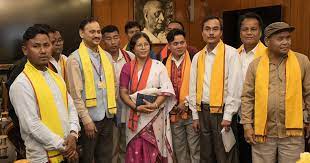Dima Hasao insurgent group signs peace pact with Assam, Centre

Dima Hasao insurgent group signs peace pact with Assam, Centre: A tribal insurgent group, Dimasa National Liberation Army (DNLA) signed the tripartite agreement with the Centre and the state government of Assam to avoid the violence and join the mainstream.
April 2023 Current Affairs Quiz
According to the MoU, the DNLA will lay down its arms and abide by the Constitution. It was decided to set up a Dimasa Welfare Council and grant a special financial package of Rs. 1,000 crores (Rs. 500 crores each by the Centre and Assam government).
About Dimasa People
- The Dimasas are one of the major tribe and a culturally rich community of Assam.
- At present the major population of the community has been residing in the hill district of Dima Hasao (erstwhile North Cachar Hills) and in scattered numbers in the districts of Karbi Anglong , Nagaon and also in the Barak valley area.
- Outside Assam the Dimasas are also settled in Nagaland.
- Language: The language spoken by the Dimasa belong to the Tibeto- Burman linguistic group. The word “Dimasa” stands for “the son of big river”.
- Historically, as the Dimasa kingdom flourished on the banks of different rivers, the people have preferred to introduce themselves as the son of a big river. Archaeological remains at Dimapur (Nagaland),Maibang (Dima Hasao district) and Khaspur (Cachar district) speak about their kingdom in these places at different phases of history .
- Society: A very outstanding feature of the Dimasa culture and an important aspect of their social relation is the existence of male and female clan. The male clan is called Sengphong and the female clan is known as Jadi or Julu .Hence a Dimasa bears allegiance to both male and female clan.
- Festival: Busu festival is observed in relation to the harvesting period of their jhum cultivation.
- When Busu is celebrated for three days it is called Busu Jidap, if it is observed for five days then is called Surem and when it is celebrated for seven days then it is called Hangseu Busu
- The celebration of the Busu festival follows with singing and dancing to the accompaniment of traditional musical instruments called the khram(drum) and the moori (blowing instrument).